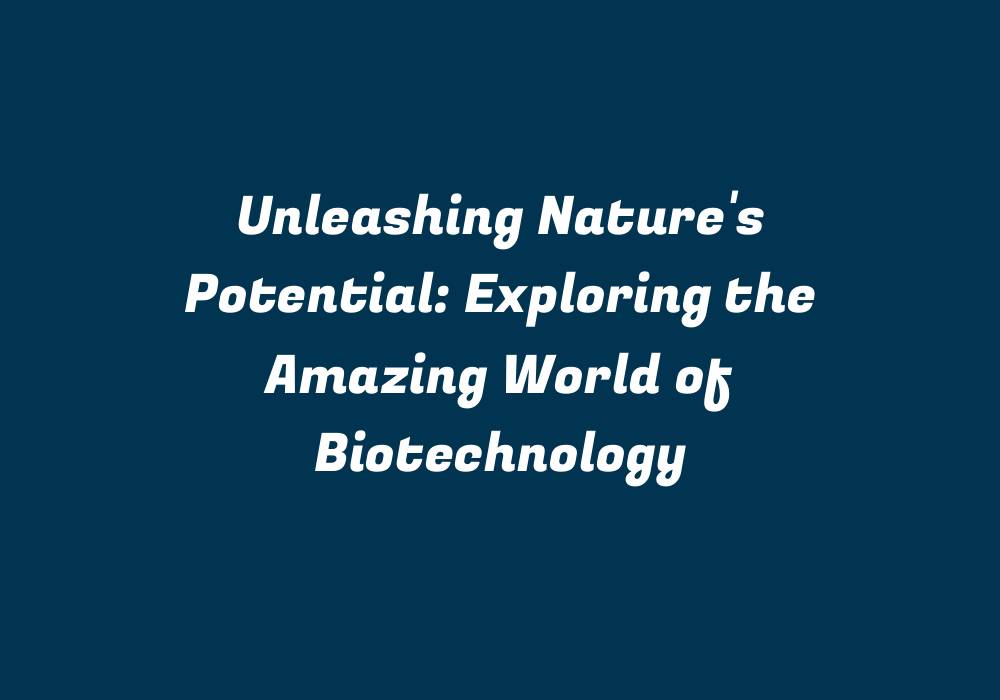Unleashing Nature’s Potential: Exploring the Amazing World of Biotechnology
Introduction to Biotechnology
In our modern world, the term biotechnology is often associated with advancements in medicine and agriculture. It refers to a wide range of applications involving living organisms, particularly microorganisms, to produce useful products or processes that enhance human life. With its vast potential, biotechnology has become an essential tool for addressing various global challenges while unraveling the secrets of nature’s complex systems.
The Evolution of Biotechnology
Biotechnology’s origins can be traced back to ancient practices such as fermentation and selective breeding, which humans used to improve the quality of crops and livestock. However, modern biotechnology emerged during the 20th century with the advancements in genetic engineering techniques. This revolution led to a significant increase in our understanding of how genes work, enabling us to manipulate DNA structures for various purposes.
Applications of Biotechnology
1. Agriculture and Food Production
One of the primary applications of biotechnology is enhancing agriculture practices by improving crop yield, resistance to pests and diseases, and tolerance to environmental stresses like drought. This has allowed us to grow more food using less land, water, and fertilizer. Additionally, we’re exploring alternative protein sources to support the increasing global population while reducing our reliance on animal-based agriculture.
2. Medicine and Healthcare
Biotechnology has brought about numerous medical breakthroughs, including gene therapy for treating genetic disorders, monoclonal antibody therapies for cancer treatment, and bioengineered insulin production for diabetes management. Moreover, research is underway to develop personalized medicine through genome sequencing, which could potentially revolutionize the way we diagnose and treat diseases in the future.
3. Environmental Management and Remediation
Biotechnology has significant potential for addressing environmental issues such as pollution control and wastewater treatment by utilizing microorganisms and enzymes that can break down harmful substances. Furthermore, it can assist in preserving biodiversity through sustainable conservation practices and developing novel methods of restoring ecosystems damaged by human activities.
4. Industrial Processes and Material Production
In the industrial sector, biotechnology has been used to improve manufacturing processes, reduce pollution, and produce renewable energy sources like biofuels. Additionally, it enables us to develop biodegradable plastics and eco-friendly materials that can replace conventional non-renewable resources in various applications.
5. Understanding Our Genetic Heritage
Biotechnology has facilitated a better understanding of the human genome and genetic diversity by allowing researchers to identify and analyze individual genomes, gene functions, and the evolutionary history of species. These insights are crucial for developing personalized medicine, understanding disease risks, and conserving biodiversity.
Potential Challenges and Concerns
1. Ethical Issues
The rise in biotechnological advancements has raised concerns about ethical implications such as human cloning, gene manipulation, and the creation of transgenic organisms. To ensure that these technologies are used responsibly and respectfully, stringent regulations and oversight mechanisms need to be implemented at global and national levels.
2. Environmental Risks
Although biotechnology can lead to more sustainable practices, there are concerns about unintended consequences, such as the release of genetically modified organisms into ecosystems. It’s essential to address these potential environmental risks through thorough research and risk assessment before implementing new technologies in large-scale applications.
3. Economic Inequality and Accessibility
Biotechnology holds great promise for improving global health, agriculture, and environmental management; however, it has not been equally accessible to all regions of the world. Addressing these disparities is crucial to ensure that everyone benefits from this remarkable field’s advances.
Conclusion: A Bright Future in Biotechnology
The possibilities of biotechnology are vast, extending across diverse fields such as medicine, agriculture, industry, and environmental conservation. By harnessing the power of living organisms and their interactions with our environment, we can unlock nature’s hidden potential to address complex challenges and improve the overall well-being of humanity and ecosystems. However, it is also essential to be mindful of the ethical and environmental concerns associated with this technology, working collaboratively to ensure that its applications bring about a sustainable future for all.
